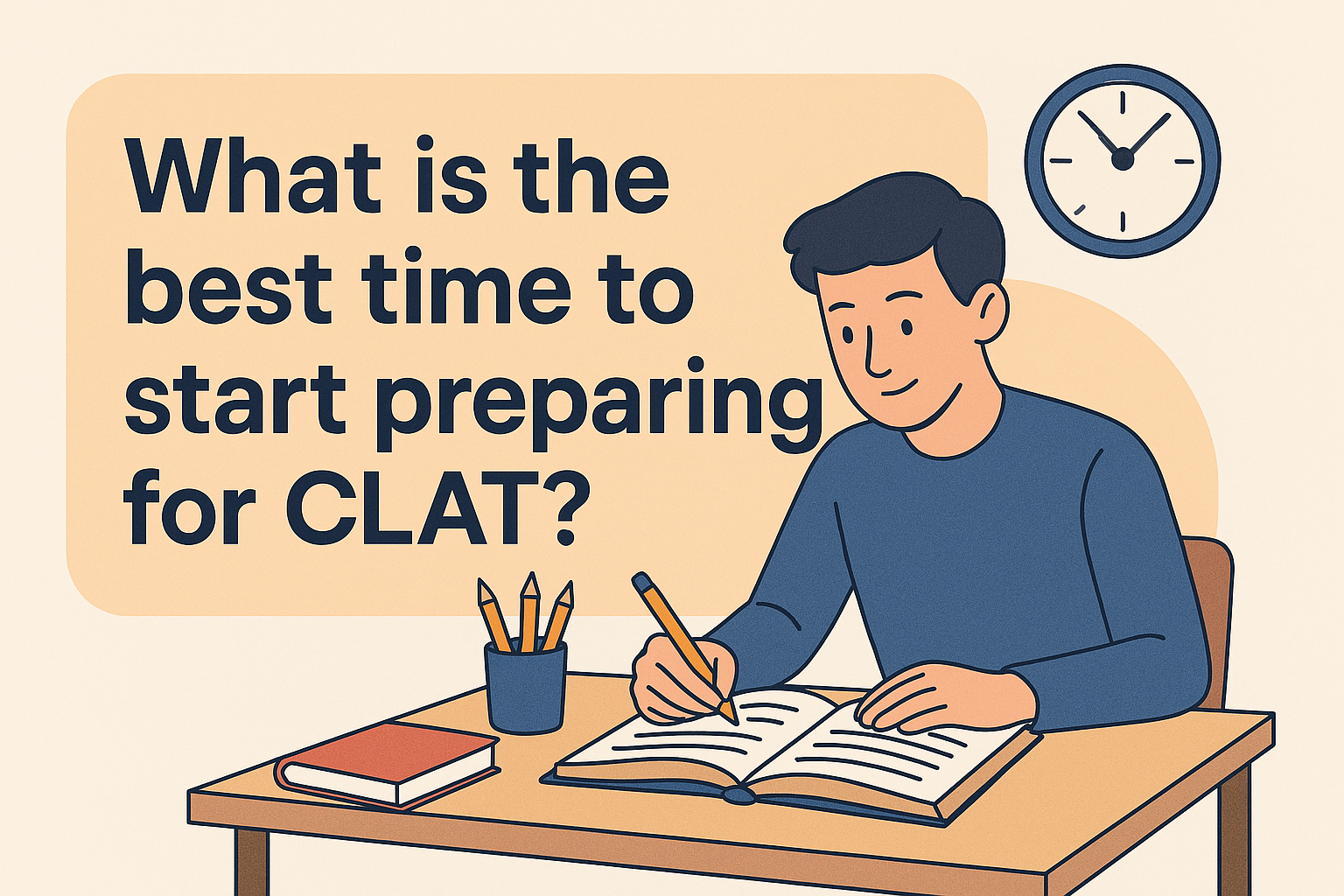What is the Best Time to Start Preparing for CLAT?
The Common Law Admission Test (CLAT) is one of the most sought-after entrance exams for law aspirants in India. It serves as a gateway to prestigious National Law Universities (NLUs) and other reputed law schools across the country. Given the competitive nature of the exam, a strategic approach to preparation is crucial. One of the most common questions students and parents ask is, "When is the best time to start preparing for CLAT?"
The answer to this question depends on multiple factors, including the candidate's familiarity with the syllabus, academic background, time availability, and personal learning pace. In this blog, we will explore the ideal timelines for CLAT preparation based on different scenarios and provide actionable insights to help aspirants plan their study schedule effectively.
Join WhatsApp community for Free Notifications, Updates, Study Material, Mock Tests, Internship Updates, and Current Affairs - CLICK HERE TO JOIN
Understanding the CLAT Exam Pattern
Before discussing the best time to start preparing, it is essential to understand the structure of the CLAT exam. The CLAT UG exam consists of five sections:
- English Language – Reading comprehension, grammar, vocabulary, and usage.
- Current Affairs, including General Knowledge – National and international news, static GK, legal knowledge.
- Legal Reasoning – Legal principles, problem-solving, and case-based scenarios.
- Logical Reasoning – Analytical reasoning, patterns, puzzles, and critical reasoning.
- Quantitative Techniques – Basic arithmetic, data interpretation, and mathematical reasoning.
The exam is two hours long and comprises 150 multiple-choice questions, with each correct answer carrying one mark and an incorrect answer incurring a 0.25-mark deduction. Given the comprehensive nature of the exam, a well-structured preparation strategy is crucial.
To Enroll in Knowledge Nation Law Centre - Click Here
Best Time to Start CLAT Preparation
1. Starting CLAT Preparation in Class 9 or 10: The Early Bird Approach
For students who are certain about pursuing law as a career, starting preparation in Class 9 or 10 can be highly beneficial. At this stage, the primary focus should be on building a strong foundation in English, logical reasoning, and general knowledge.
Advantages of Early Preparation:
- Ample time to develop reading habits and improve vocabulary.
- Better understanding of logical and analytical reasoning concepts.
- Opportunity to follow current affairs consistently and develop legal awareness over time.
- Gradual and stress-free preparation without compromising on school studies.
How to Prepare at This Stage?
- Read newspapers like The Hindu or The Indian Express daily.
- Solve puzzles, Sudoku, and logical reasoning problems.
- Build a habit of reading novels, essays, and legal articles to enhance comprehension skills.
- Stay updated with basic legal terms and concepts.
2. Starting CLAT Preparation in Class 11: The Balanced Approach
Many students begin their CLAT preparation in Class 11, which provides a reasonable two-year window for structured study. This timeline is ideal because it allows students to focus on both school curriculum and CLAT topics without excessive pressure.
Advantages of Starting in Class 11:
- Sufficient time to cover all subjects thoroughly.
- Consistent practice with mock tests and previous year papers.
- More time to strengthen weak areas and develop speed and accuracy.
- Reduces the burden of last-minute cramming.
How to Prepare at This Stage?
- Dedicate 1–2 hours daily for CLAT preparation alongside school studies.
- Follow a structured study plan covering each subject.
- Enroll in coaching classes or take online courses if needed.
- Attempt weekly mock tests to track progress and improve time management.
Join WhatsApp community for Free Notifications, Updates, Study Material, Mock Tests, Internship Updates, and Current Affairs - CLICK HERE TO JOIN
3. Starting CLAT Preparation in Class 12: The Focused Approach
Many students begin their CLAT preparation in Class 12, often balancing it with board exam studies. While this approach is possible, it requires strong time management skills to avoid neglecting either CLAT or board exams.
Advantages of Starting in Class 12:
- Fresh familiarity with academic subjects, especially English and quantitative techniques.
- Increased awareness of national and international current affairs.
- More motivation and focus due to the urgency of the exam approaching.
How to Prepare at This Stage?
- Allocate 2–3 hours daily for CLAT preparation, apart from school studies.
- Focus on high-weightage topics and solve previous year question papers.
- Prioritize mock tests and sectional tests to improve speed and accuracy.
- Read newspapers and monthly current affairs compilations to stay updated.
To Enroll in Knowledge Nation Law Centre - Click Here
4. Starting CLAT Preparation After Class 12: The Crash Course Approach
Some students decide to prepare for CLAT after completing Class 12 or take a drop year to focus solely on the exam. This approach requires intensive study and complete dedication for 6–12 months.
Advantages of a Drop Year Preparation:
- Full-time focus on CLAT without school-related distractions.
- Ability to take multiple mock tests and strengthen weak areas.
- Flexibility to join a coaching institute for guided preparation.
How to Prepare at This Stage?
- Dedicate 6–8 hours daily for structured study.
- Follow a rigorous mock test schedule (at least 3–4 per week).
- Analyze mistakes in mock tests and improve problem-solving techniques.
- Read legal journals, editorials, and CLAT preparation books thoroughly.
Key Takeaways: When Should You Start Preparing for CLAT?
Starting Time Preparation Duration Suitable For Class 9 or 10 3–4 years Early starters, stress-free learning Class 11 2 years Balanced learners, school-friendly preparation Class 12 1 year Focused students, board-exam balance After Class 12 6–12 months Drop-year candidates, intensive learning
Join WhatsApp community for Free Notifications, Updates, Study Material, Mock Tests, Internship Updates, and Current Affairs - CLICK HERE TO JOIN
Conclusion
There is no one-size-fits-all approach to CLAT preparation. The best time to start depends on your personal learning style, academic schedule, and commitment level. However, starting early provides the advantage of gradual learning and stress-free preparation, while late starters must adopt a rigorous and focused approach to make the most of their available time.
Regardless of when you begin, consistent practice, strategic planning, and regular mock tests are key to acing the CLAT exam. Whether you start in Class 9, 11, 12, or after school, make sure to stay dedicated, stay updated with current affairs, and refine your problem-solving skills through practice.
If you have any queries regarding CLAT preparation, feel free to drop a comment below. Happy studying and best of luck for your CLAT journey!

 Info@Knowledgenation.co.in
Info@Knowledgenation.co.in











Leave a Comment